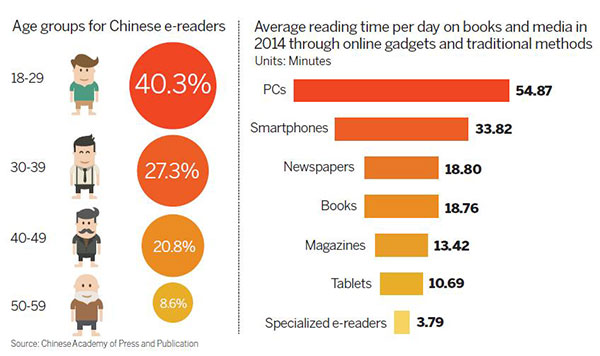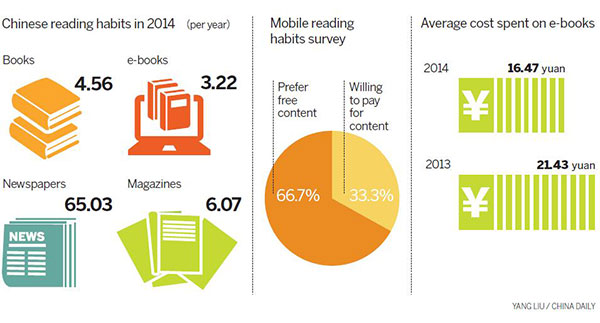

"It takes time to accumulate users," said Cheng Xiangjun, chief executive officer of iReader. "We have been plowing money into mobile reading for years (without giving details).
"Our vast collection of books is our most valuable asset," he added.
At the last count, iReader had more than 400,000 e-books, which were mostly Chinese language, with 90 percent converted from hard copies. But that is still 220,000 less than Tencent's library.
"Internet heavyweights are cash-rich, but they can't convert hard copy books into e-versions and audio products simply by throwing money at the problem," Cheng said. "It is a time consuming process."
Another obstacle facing Tencent and Alibaba is the issue of copyright. Although both companies and the majority of online readers are aware of intellectual property rights, piracy is still rampant on the Web.
"Most readers still stick to the habit of downloading books for free from computers and digesting them on mobile phones," Yao said. "But sometimes they don't know that they could be breaking copyright laws."
The report by the Chinese Academy of Press and Publication showed only 33 percent of mobile readers were willing to pay for e-books. Also, the average cost spent on e-books was down to 16 yuan last year compared with 22 yuan in 2013.
What makes this even more complicated is that some authors are reluctant to release e-versions because of poor royalty fees.
"In general, when books are sold in hard copies, authors usually get between 8 percent to 15 percent of the sales revenue," said Tao Weipeng, an editor of e-books in China CITIC Press, a leading publisher in China.
"While in terms of e-books, which are 60 percent cheaper, the income for authors is significantly less. And the sales volume does not make up for that shortfall."
But despite problems, the boom in e-books is unlikely to turn into a bust.
"As Internet giants beef up their e-book catalogs and industry regulators intensify efforts to crack down on copyright violations, more users will shift to mobile reading for entertainment," Yao said. "This is a growing trend."
Ma Si contributed to this story.
